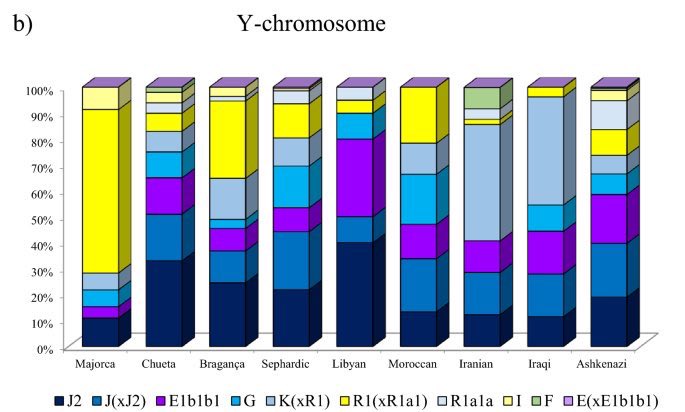Was Jesus a Jew?

Was Jesus a Jew? The answer is both yes and no, as this is an extremely nuanced question with a convoluted answer. Due to this complexity, the goal of this article is to address the technicalities behind both answers and explain why Christ was a “Jew” according to the contextual application of this term’s etymological root, but not a “Jew” according to its current usage and the connotations now attached to it.
As for the answer, “yes, Christ was a Jew”:
By claiming that “Christ was not a Jew”, we are allowing the “Synagogue of Satan” to hijack this name for themselves. Remember, the Synagogue of Satan is not comprised of “Jews”, but those “who say that they are Jews and are not, but lie…” (Revelation 2:9, Revelation 3:9)
See, the term “Jew” is simply an anglicization of the Latin term “IVDAEVS”, which itself derives from the Greek term “Ἰουδαῖος”—denoting a Judahite (a patrilineal descendant of Judah), a Judean (an inhabitant or citizen of the region of Judaea), or a Proselyte (a convert to Old Testament Judaism—Yahwism). Therefore, the term “Jew” can technically refer to either of the aforementioned, and can thus be applied to Jesus, as He was a Tribal Judahite.
And, how can we know that “Ἰουδαῖος” (Ioudaios; singular, nominative, masculine noun), as well as related terms from which “Jew” derives, can refer to either a Judahite, a Judean, or a Proselyte?
As for Judahite) The Greek term “Ἰουδαῖος” is a Hellenized form of the Hebrew term “יְהוּדִי” (Yehudi), which denoted “a Judahite” and derived from the Hebrew name of Judah—יְהֻד (Yehud). The contextual application of “Ἰουδαῖος” as Judahite is best evident through Jesus, as He was neither a Judean or a Proselyte (convert to Judaism). Rather, He was a Galilean, and Galilee was not a region of Judaea. Nonetheless, there are instances in which Christ is referred to as a “Jew” (Ἰουδαῖος/Ioudaios), or where an apostle uses the term to describe Christ’s Judahite followers:
- John 4:9: “The Samaritan woman said to him, ‘You are a Jew (Ἰουδαῖος/Ioudaios) and I am a Samaritan woman. How can you ask me for a drink?’”. Christ does not object to being referred to as this, which proves that “Ἰουδαῖος” did not solely refer to a Judean or Proselyte, but also a Judahite.
- John 4:22: “‘Woman’, Jesus replied, ‘believe me, a time is coming when you will worship the Father neither on this mountain nor in Jerusalem. You Samaritans worship what you do not know; we worship what we do know, for salvation is from the Jews (Ἰουδαῖον/Ioudaion; accusative singular form of Ἰουδαῖος/Ioudaios).’” Christ is the one who brings salvation, so if He says, “salvation is from the Jews (Ἰουδαῖον/Ioudaion; accusative singular form of Ἰουδαῖος/Ioudaios)”, that means He is referring to Himself as a Jew or Ἰουδαῖος/Ioudaios.
- Romans 1:16: “For I am not ashamed of the gospel, because it is the power of God that brings salvation to everyone who believes: first to the Jew (Ἰουδαῖος/Ioudaios), then to the Gentile.” Certainly, Paul was not speaking of any Judean, but the Judahites in specific, whom Christ was sent to and later instructed His apostles to preach to (Matthew 10:5-6, Matthew 15: 24).
Thus, through contextual analysis and inductive reasoning, we can conclude that Christ is called a “Jew” (Ἰουδαῖος/Ioudaios) in relation to His Judahite ancestry—and by extension, “Ἰουδαῖος” (Ioudaios) can be applied to any Judahite, regardless of religion or locality.
As for Judean) One example of evidence is John 7:1, which states: “After this Jesus went about in Galilee. He would not go about in Judea, because the Jews (Ἰουδαῖοι/Ioudaioi; nominative plural form of Ἰουδαῖος/Ioudaios) were seeking to kill him.” For one, the term “Judea” is translated from the Greek “Ἰουδαίᾳ” (Ioudaia), which is etymologically related to Ἰουδαῖος/Ioudaios. It thus follows that anybody from Ἰουδαίᾳ (Ioudaia), or dwelling in it, would be referred to as a “Ἰουδαῖος” (Ioudaios: singular, nominative, masculine noun). Secondly, in the context of John 7:1, “Ἰουδαῖοι” (Ioudaioi; nominative plural form of Ἰουδαῖος/Ioudaios) is best understood as Judeans rather than“Judahites” or “Judaizers”. If we were to interpret “Ἰουδαῖοι” (Ioudaioi; nominative plural form of Ἰουδαῖος/Ioudaios) as meaning “Judahites”, the passage would be incoherent, as Judahites were present throughout Galilee as well, including Jesus and His disciples. Moreover, hostility toward Jesus existed in Galilee too—even at the hands of Tribal Judahites—as seen in Luke 4:16–30, where the people of Nazareth (Jesus’ hometown in Galilee) attempt to throw Him off a cliff, and Mark 3:6, where local Pharisees conspire with the Herodians to destroy Him. Essentially, if Christ faced opposition from Judahites in Galilee, why would John 7:1 state that He left Judea for Galilee because the Judahites wanted to kill Him? If “Ioudaioi” meant “Judahites” in an ethnic sense, the threat would exist equally in Galilee, where many ethnic Judahites also lived. Therefore, the logic of leaving one place for another would collapse unless a regional distinction is being made. Ultimately, John 7:1 is not making an ethnic or tribal distinction, but rather a regional and sociopolitical
As for Proselyte) In Esther 8:17, we read: “And in every province and in every city, wherever the king’s command and his edict reached… many from the peoples of the country declared themselves Jews, for fear of the Jews had fallen on them.” In the Septuagint Translation of this verse, “declared themselves Jews” is translated from “Ἰουδάιζον” (Ioudaizon; singular present active participle, nominative masculine form of the verb ἰουδαΐζω/Ioudaizō), meaning to Judaize. While Ἰουδαῖος and Ἰουδάιζον are separate terms, they are both translated as “Jew” or “Jews”, and share an etymological origin.
That anybody could be deemed a “Jew” (Ἰουδαῖος/Ioudaios) upon conversion to Old Testament Judaism (or more accurately, Yahwism)—similarly to the gentiles in Esther 8:17—is proven by the Apostle Paul, who was a Tribal Benjaminite, as proclaimed in Romans 11:1 and Philippians 3:4-5:
- “I ask, then, has God rejected his people? By no means! For I myself am an Israelite, a descendant of Abraham, a member of the tribe of Benjamin.” (Romans 11:1)
- “If anyone else thinks he has reason for confidence in the flesh, I have more: circumcised on the eighth day, of the people of Israel, of the tribe of Benjamin, a Hebrew of Hebrews; as to the law, a Pharisee…” (Philippians 3:4-5)
In spite of his tribal heritage, in Acts 21:39 and Acts 22:3, he refers to himself as a “Jew” (Ἰουδαῖος/Ioudaios):
- “Paul replied, ‘I am a Jew (Ἰουδαῖος/Ioudaios), from Tarsus in Cilicia, a citizen of no obscure city. I beg you, permit me to speak to the people.’” (Acts 21:39)
- “I am a Jew (Ἰουδαῖος/Ioudaios), born in Tarsus in Cilicia, but brought up in this city, educated at the feet of Gamaliel according to the strict manner of the law of our fathers, being zealous for God as all of you are this day.” (Acts 22:3)
In these instances, he is evidently referring to himself as a “Jew” (Ἰουδαῖος/Ioudaios) in a religious context, and therefore serves as evidence that a non-Judahite who Judaized and practiced Yahwism would be referred to as a “Jew” (Ἰουδαῖος/Ioudaios). Proof of this contextual application is found in Galatians 1:13–14 and 1 Corinthians 9:20, which state:
- “For you have heard of my former life in Judaism (Ἰουδαϊσμῷ/Ioudaismō; dative masculine singular), how I persecuted the church of God violently and tried to destroy it. And I was advancing in Judaism (Ἰουδαϊσμῷ/Ioudaismō; dative Masculine Singular) beyond many of my own age among my people, so extremely zealous was I for the traditions of my fathers.” (Galatians 1:13–14)
- “To the Jews (Ἰουδαίοις/Ioudaiois; dative masculine plural) I became as a Jew (Ἰουδαίοις/Ioudaiois; nominative masculine singular), in order to win Jews (Ἰουδαίους/Ioudaious; accusative masculine plural). To those under the law I became as one under the law (though not being myself under the law) that I might win those under the law.” (1 Corinthians 9:20)
It is thus evident through both Second Temple Period Judaizers and the Apostle Paul that non-Judahites who Judaized were deemed “Ἰουδαῖος” (Ioudaios)—a term translated as “Jew” in English.
In regard to extra-biblical evidence for the application of “Ἰουδαῖος” (Ioudaios) to denote a religious convert, a third-century work titled “Historia Romana” by the Roman historian Cassius Dio states: “I do not know the origin of this name loudaios, but it is applied to all men, even foreigners, who follow their customs. This race is found even among the Romans” (Historia Romana, 37.17.1). Here, we are told that anybody who adopted the customs of the Ioudaion would be deemed a Ioudaios, regardless of ancestry or nationality. Of course, the customs of the Ioudaion were rooted in the Torah, and would thus be tethered to the Old Testament religion of Israel (Yahwism). Accordingly, the term “Ἰουδαῖος” (Ioudaios) was applied to non-Judahite converts, not only Judahites or Judeans.
Now of course, one may still contend against Christ being referred to as a “Jew” by claiming that the term “Jew” did not exist until the 16th century, when the letter J was invented—beforehand, the term in use was the Middle English “Iew” (12th–13th centuries AD). That said, this contention is flawed. For one, the term “Israelite” did not exist until the 13th to 14th centuries AD, as it is an anglicization of the Latin term ‘ISRAELITA’ and the Greek term ‘Ἰσραηλίτης’ (Israēlitēs), which were both cognates of the Hebrew term יִשְׂרְאֵלִי (Yisra’eli)—yet, we still refer to a descendant of Jacob as an “Israelite”. Likewise, the name ‘Jesus’ did not exist until the 16th century AD, as it is an anglicization of the Latin term “IESVS” and the Greek term “Ἰησοῦς” (Iēsous), which were both cognates of the Hebrew name “יֵשׁוּעַ” (Yeshua)—yet, Christians still refer to their Lord and Saviour as “Jesus”. Therefore, claiming that we cannot refer to Jesus as a “Jew” because the term is a modern anglicization is akin to stating that we cannot refer to a “יִשְׂרְאֵלִי” (Yisra’eli) as an Israelite, or that we cannot refer to “יֵשׁוּעַ” (Yeshua) as “Jesus”. Ultimately, claiming that “Jesus was not a Jew” because “Jew” is an anglicization is equal to saying that “Jesus was not an Israelite” because the original cognate is “יִשְׂרְאֵלִי” (Yisra’eli), and ‘Israelite’ is a modern anglicization. This argument is inconsistent and relies upon a double-standard.
Conclusively, the term “Jew” is technically applicable to Christ, as the etymological roots for the term “Jew” were applied to Judahites. Moreover, numerous modern definitions for the term “Jew” state that it pertains to a descendant of Judah or Israel:
- “a member of the tribe of Judah” (https://www.merriam-webster.
com/dictionary/Jew )
- “one of a scattered group of people that traces its descent from the Biblical Hebrews or from postexilic adherents of Judaism; Israelite” (https://www.dictionary.com/
browse/jew)
In my opinion, we should be cautious with our wording. Saying that “Christ was not a Jew” is easily refutable by conventional standards and opens us up to unnecessary criticism. It would be better to say, “Yes, Christ was a Jew, but you modern converts are not, so stop pretending to be the same”. To reiterate, in Revelation 2:9 and Revelation 3:9, Christ condemns those “who say that they are Jews and are not, but lie.” If Christ is saying that they are claiming to be “Jews”, why is this the case? Is it because they are claiming to be Talmudic Zionists from the 21st century, or because they are claiming to be of Judah? Evidently, the latter.
Again, are we to allow the Synagogue of Satan to hijack the name “Jew”? While we certainly could, and instead refer to the true “Jews” as Judahites, the principle stands: If somebody stole your full name, would you change it to something else, or would you call them out and demand they stop calling themselves by your name? Certainly the latter.
As for the answer, “no, Christ was not a Jew”:
While Jesus could be referred to as a “Jew” according to the contextual applications for this term’s etymological roots, those who refer to Christ as a “Jew” often do so as a means to liken Him to modern “Jews”—who are not Jews, but blasphemers with a false identity. Accordingly, the true issue is not whether Christ was a Jew, but whether modern “Jews” are truly Judahites (patrilineal descendants of Judah). Both atDNA, YDNA, and scripture prove that the majority of them are not patrilineal Israelites, but rather tribal Canaanites, Edomites, and offspring of other gentile bloodlines.
Some points of evidence include:
– The planting of foreigners in Judaea by Persians during the Second Temple Period (Ezra 4:1-10).
– Mass Judaization throughout the Persian Empire during the time of Esther (Esther 8:17).
– Mass Judaization of the Edomites imposed by John Hyrcanus I (Josephus’ Antiquities of the Jews, Book 13, Chapter 9, Sections 1-2; prophesied in Amos 9:11-12).
– Admixture between Second Temple Period Judahites and the aforementioned migrants/converts (Ezra 9:1-2, Ezra 10:10, Nehemiah 13:25-27).
– Gentiles who converted to Judaism in the first-century AD (Acts 13:43)
– Those who claim to be “Jews”, and are not, but lie (Revelation 2:9/3:9).
– The true Judahites losing their old name (Jew, IVDAEVS, Ἰουδαῖος, יְהוּדִי) and inheriting a new one (Christians), while the disobedient of Israel are killed off (Isaiah 65:1-15).
– The Israelite-exiles being grafted into a New Covenant—Christianity—which modern “Jews” deny and slander (Jeremiah 31:31-34, Isaiah 54:10, Isaiah 55:3, Isaiah 61:8, Ezekiel 34:25, Ezekiel 36:26-27, Ezekiel 37:26).
– The Israelites thriving post-exile, being martially dominant, and conquering nations along their migrations—which only Christendom fulfills (Deuteronomy 33:17 ESV/NASB*, Micah 5:8-9, Isaiah 54:2-3, Zechariah 10:6-9) – https://youtu.be/_
– The Canaanites who inhabit the Holy Land prior to New Jerusalem, which is a future event (Zechariah 14:21; parallel with Revelation 22).
– Archaeogenetic atDNA results of modern “Jews” proving that they are primarily descended from Canaanites (some examples provided in the images below): https://english.m.tau.

– YDNA haplogroup variance among all Jewish demographics. This is problematic, as Israelite Tribal identity was solely dictated by patrilineality, and all legitimate Judahites will carry the exact same YDNA haplogroup—modern Jews do not.

– Matrilineal inheritance of Jewish identity according to Halakha (Jewish Law), as opposed to the Biblical patrilineal succession. This further diminishes tribal/patrilineal continuity.
Thus, what modern “Jews” do is conflate ancient terms (IVDAEVS, Ἰουδαῖος, יְהוּדִי) with their modern etymological-cognate (Jew), and then assume that there is continuity in their contextual applications. The reason they do this is so that they can disenfranchise the Christian “goyim” and project an illusion of superiority and disproportionate importance. They essentially assert that “Jesus was a Jew” as a means to claim that “Jesus was one of us”, and thus, “you cannot criticize or oppose us, because we are God’s chosen people, your ‘saviours’ tribal kin”. Unfortunately for them, this is patently false, as there is plenty of patrilineal diversity among Jewish populations worldwide and their Talmudic Judaism is incompatible with the Tanakh and New Testament.
Accordingly, the root of this issue is that convert lineages have hijacked the name “Jew”, and it has now come to be viewed as synonymous with modern “Jews”. So, while ‘Jew’ is an applicable term for Christ, there are far too many connotations attached due to what the term has come to represent. The belief that “Jesus was not a Jew” is rooted in a desire to delineate Christ from the “Synagogue of Satan”, whose adherents claim to be Jews and are not, but lie. However, it is the Synagogue of Satan which lies and claims to be Jews—not Christ, who is “falsely called a Jew”. Those who claim that “Christ is not a Jew” do so because they base their perception of a “Jew” off modern “Jews” who stole this ethnonym for themselves. Nonetheless, those who adhere to this belief will still call the offspring of Jacob “Israel”, despite the fact that modern “Jews” also took the name of “Israel” for themselves. This is a blatant double-standard rooted in a scandalization of anything revolving the term “Jew”. While dissent against modern “Jews” and the false state of “Israel” is warranted, we must not allow our emotions to cloud our judgement and diminish our factuality when addressing the “Jewish Question”—it only hurts our agenda. If we can be factually sound and coherent with our contentions, we will be taken seriously and mitigate the chance that dissenters set out to refute us.
So, was Jesus as Jew? The answer to this question is dependant on what one means by “Jew”. If their implication is that Jesus was a Judahite, from which the term “Jew” etymologically derives, they are correct. But, if their implication is that Jesus is akin to modern “Jews”, or a Jew in the conventional sense, they are wrong.

